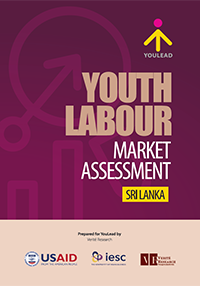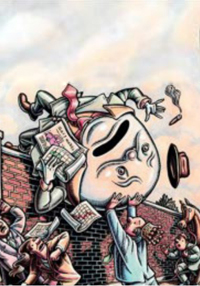The role played by the Cabinet of Ministers is critical to ensure that the government functions efficiently and effectively. Verité Research has found that the way in which Cabinet portfolios are designed in Sri Lanka impedes the ability of government to be effective.
The Youth Labour Market Assessment takes an in-depth look at youth employment and unemployment in Sri Lanka. This report examines 4 gaps; skills gap, aspirations gap, information gap and the structural gap, which are used to explain the paradox of high youth unemployment in a country which has a large number of job opportunities available presently. Bridging these gaps, especially in the high growth sectors in Sri Lanka is a priority for policymakers. Analysis from a primary survey of 2,000 youth and 211 employers are the main data source for the report. The report provides detailed insights on unemployed youth, constrained youth, employed youth, gender and entrepreneurship training. An abridged version of the full report is also made available, and provides key findings and recommendations that are pertinent to the private sector, donor community and vocational training providers. The report was produced for YouLead, a USAID-funded youth employability and business startup programme working to improve youth employability outcomes by addressing bottlenecks in the technical and vocational education and training sector in Sri Lanka. Click here for abridged version with key findings and recommendations The data from the 2 primary surveys can be assessed below: YouLead Youth Survey YouLead Employer Survey Youth…
The Global Competitiveness Index (GCI), ranks the competitiveness of economies. The GCI score is calculated using two types of indicators: objective (or measurable) indicators and sentiment (or subjective) indicators. While Sri Lanka has experienced a steady increase in the objective indicators, the steep decline in sentiment indicators have overshadowed these improvements, driving down the country’s overall score and rank.
This study presents a review of the topics relevant to the debate on private sector participation in tertiary education. These include: the structure of the tertiary education sector; the legislation underlying the establishment of tertiary education establishments; and the current quality assurance and accreditation procedures for tertiary education institutions.
Every year, on the 31st of May, the World Health Organisation (WHO) and partners mark World No Tobacco Day. This day is set apart to highlight the health risks associated with tobacco use and to advocate for effective policies to reduce tobacco consumption. According to WHO “Tobacco kills nearly six million people each year, of which more than 600,000 are non-smokers dying from breathing second-hand smoke”. This is not just a global problem but also a problem for Sri Lanka. Due to poor management of taxation not only have cigarettes become more affordable, but the tax share of the under-priced cigarettes has also declined. Two things have resulted from that: first, consumption of cigarettes have begun to increase (it went up by almost 10% in 2015). Second, potential tax revenues are being lost to government and transferred as income to the producer. This is both a health issue and an issue of public finance for Sri Lanka. Therefore, the Sri Lankan parliament has a responsibility to oversee the taxation measures and address the bureaucratic discretion that is eroding the benefits of public health and public finance.
Elected officials and selected bureaucrats are given a huge amount of power to act on behalf of the public – modern democracies function on this basis: that citizens hand over their power to elected representatives. But how can citizens then protect themselves against those individuals misusing that power? This is the perennial problem of governance. The simple answer that is given to this question of governance, is “elections” – that elections ensure the displacement of politicians who violate the public trust, and thus create political incentives for better behaviour. This Insight provides an example, which explains why the answer cannot be that simple – the behaviour of officials during elections can both abuse public trust, as well as benefit these officials politically. As such, other governance solutions are needed.
Most people in a country don’t understand the intricacies of exchange rate management. Nevertheless, actions in this regard have significant implications for the economic stability, growth and overall success of the economy, on which human development is fostered. This Insight explains how a professional approach to the management of the exchange rate seems to have been trumped by political considerations for much of 2015. The losses suffered by a lack of professionalism are not too different to the losses suffered due to corruption, and the lack of professionalism and corruption tend to be parasitic on each other. Therefore, this Insight also points to an important focus that has not yet been adopted by the agenda for good-governance.
Sri Lanka has been driving post-war growth in boom and bust cycles on the trade deficit; and fiscal measures have been used, especially spending on construction, to offset the bust cycles. This strategy is now being squeezed to pulp and it is not sustainable going forward.
In February 2015 the Central Bank of Sri Lanka called an auction for one billion rupees on a 30 year bond. It then accepted 10 fold – 10 billion rupees – after the bids were in. This Insight identifies three errors in the published calculation of the monetary loss, and recalculates it at 0.9 billion rupees. It also highlights two other issues: conflict of interest, and confidence in institutions, which add to the negative consequences of the Central Bank decision.
The government first raised international debt through bonds in October 2007. Since then several international bonds have been issued to feed the government’s twin demands: financing its spending and propping up foreign reserves. While this trend of foreign borrowing is on the rise, what is happening to the cost of borrowing? And what is the prognosis for the future?









